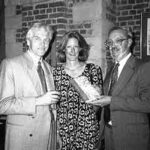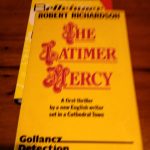t was during the mid eighties – the period when the newspaper headlines were full of stories of Britain on strike – that broadsheet journalist Robert Richardson chanced upon writing his first detective novel. It was sheer escapism for him and his readers. The Latimer Mercy (1985) gave us a charming amateur sleuth, rather full of himself and a delightful series of incidents such as a missing actress and mystery of a stolen old Bible (“the mercy”). His name, which he rather forces on his suspects, is MALTRAVERS. It is set in a Roman cathedral city known as Vercaster – loosely based on his hometown of St Albans. His actress girlfriend Tess joins the playwright in this and other investigations. The book received a good start winning the Creasey Award for best first crime novel. His next book concerned the murder of a titled heir, and was followed by a Sherlockian pastiche in The Book of the Dead.
Richardson’s early books obviously paid homage to Christie, Sayers and others such as Chesterton. He was admired by those in the business for his pacing and ability to be humorous and convincing. Advised by his editor that times were changing he began to experiment, moving toward the psychological side of crime fiction. But although novels such as Significant Others received good notices Robert found stand alone novels lacked sparkle. Victims (1997) was his last book.
Robert preferred to become an exponent of the merits and attractions of crime fiction. He was asked to be chairperson of the Crime Writer’s Association on two occasions. His convivial personality and knowledge of the genre, not forgetting his contacts from the media world enhanced the status of crime writers. He much admired the early Scorpion Press titles with authors such as Ruth Rendell, Jonathan Gash, Colin Dexter, Peter Lovesey and Len Deighton. The very first Scorpion production was a Gus Maltravers mystery, Sleeping in the Blood. A special edition, bound in leather with marbled sides, of 75 copies with an appreciation by Robert Barnard. It received a sparkling review in London’s local paper The Hampstead and Highgate Gazette. Robert was pleased as punch!
In his later year. s he resumed editorial roles for papers such as The Observer. He had a sharp eye for detail and was well-liked. He passed in 2021.















